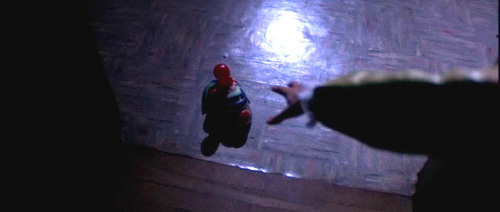By that, of course, I mean the John Carpenter film. Seattle-based Parallax View has begun performing, under the editorship of Sean Axmaker, an invaluable service to film scholarship: publishing the entire back catalog of Movietone News on the web. That great publication, edited through the 1970s and into the 1980s by Richard T. Jameson before he topped the masthead of Film Comment for the duration of the 1990s, was proclaimed “The best publication on film in the English language” by Molly Haskell.
All of which brings us back to the Days of the Dead in which we are currently living (and dying), and Jameson’s review of the anamorphically photographed 1978 Carpenter movie that redefined the holiday, and horror filmmaking, for the next generation. RTJ plunges straight into the heart of the matter in his opening paragraphs (originally published in the February 1979 issue of MTN:
A thing that bugs me about the vast majority of contemporary films is, they rarely give the feeling anyone cared much about framing them. The movement away from studio (i.e., factory) filmmaking has had a lot to do with this. Advancements in film speed, equipment mobility, and other such factors that ought to have been unqualifiedly liberating have had the counterproductive effect of encouraging slovenliness rather than responsible flexibility. A movie can get made anywhere now, one place is as good (i.e., workable) as another–and somehow that extends to frame-space as a “place” too. Throw in careless labwork (we waved byebye to real Technicolor several years ago) and you’ve got smeary colors and big, fuzzy grain to help reduce definition, and definitiveness of vision. It’s hard to maintain faith that a given movie had to look the way it does, because it could just as well have looked, well, a little different.
People won’t be talking about this as they leave their naborhood moviehouse,¹ but one reason John Carpenter’s “Halloween” is so successful a marrow-freezer is that Carpenter appears to have set out to reinstate scrupulous, meaningful framing all by himself. In fact, except for its shamelessly (and irresistibly) zingy music score (by the director), “Halloween” achieves its considerable power almost entirely through visual means. There’s not a lot of scenario–make that screenplay–to deal with; indeed, the least satisfying thing about “Halloween” is its attempt to arrive at some scriptoral accounting for its ultraweird dispenser of mayhem, an “Omen”-era, cosmic-evil reading–“He” really can’t be stopped–that rings too familiar. At the same time, the nonending ending “Halloween” reaches has a validity missing from more flagrantly copout conclusions where the filmmakers more or less simultaneously ran out of running time and ideas of what to do next. For Carpenter’s direction has undercut the idea of a world with any secure breathing-room, let alone a sanctum for salvation.

(Read the rest here.) Those who wonder about my concern with the seemingly perverse notion that framing matters (and cutting, and blocking…) look no further than RTJ’s incisive observation about films 30 years ago: “It’s hard to maintain faith that a given movie had to look the way it does, because it could just as well have looked, well, a little different.” In other words, most movies — even way back then — conveyed a certain indifference in the way they were composed and assembled. The general situation, I’m saddened to report, has not improved.
¹ The Pittsburghian RTN explains: “The error was deliberate, the legacy of a format I’d see every weekend of my youth in the arts-and-entertainment section of the Sunday edition of the Pittsburgh Press; listings for all the non-downtown and non-art showplaces were gathered under the heading NABORHOOD THEATERS (appearing on a marquee that suggested a drive-in screen, or vice versa). I didn’t expect many MTN readers to have grown up with the same association, yet I liked the popcult/populist air of it, and trusted that the “misspelling” was so egregious that it would be recognized as some kind of fond joke, even if the reader wasn’t quite sure what the joke was.”











